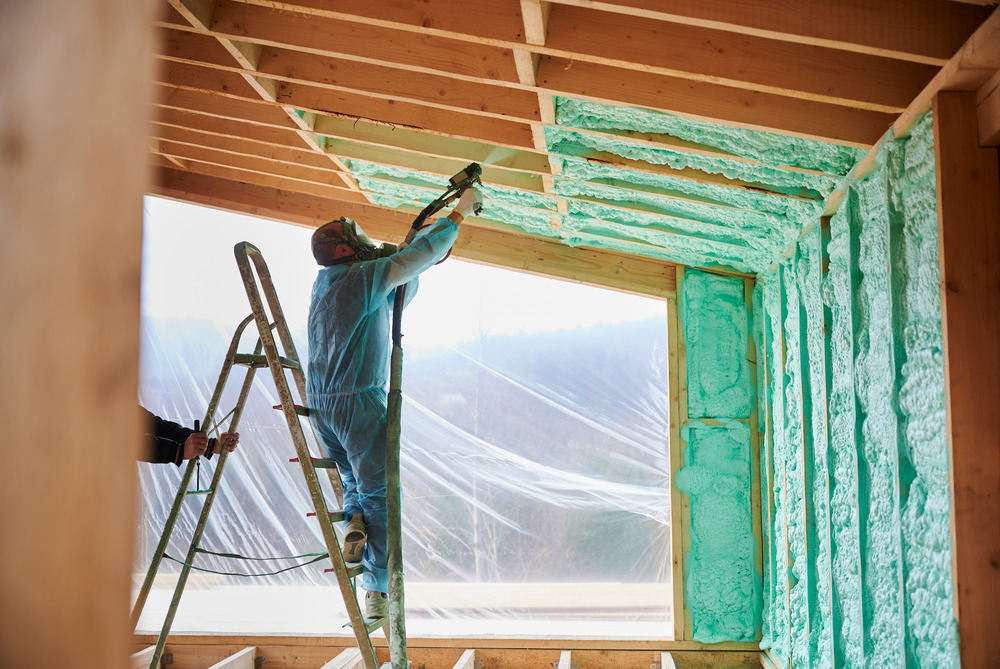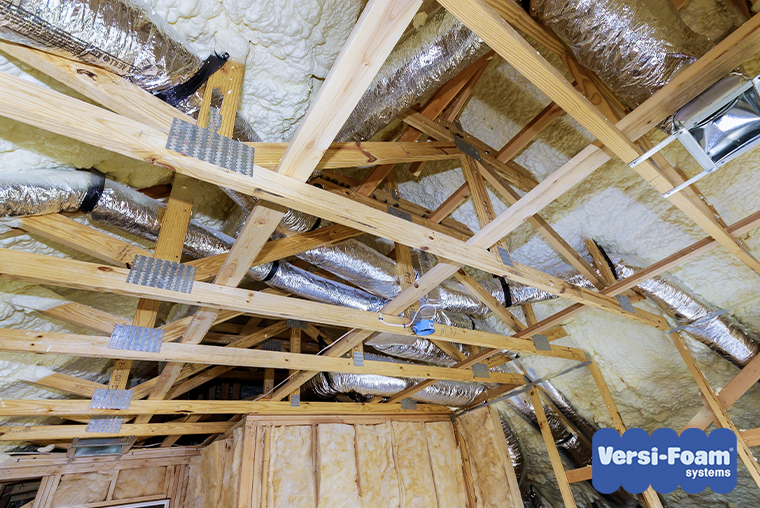The Ecological Impact of Spray Foam: Sustainability Considerations
Spray Foam: The Ultimate Option for Air Sealing and Insulation
Spray foam insulation has emerged as a leading service for effective air sealing and thermal insulation, using a special combination of homes that set it apart from conventional methods. Recognizing the full range of its benefits, setup processes, and comparisons with various other insulation types is essential for making informed decisions.
What Is Spray Foam?
Spray foam is a functional insulation material that incorporates the concepts of air securing and thermal resistance to enhance energy performance in buildings. Composed largely of polyurethane or other comparable substances, spray foam is applied as a fluid that broadens upon contact with surface areas, creating a solid, continuous layer of insulation. This one-of-a-kind residential or commercial property enables it to fill gaps, fractures, and spaces that conventional insulation products may overlook, giving a superior air seal.
There are 2 major sorts of spray foam: open-cell and closed-cell. Open-cell spray foam is lighter and much more adaptable, using excellent audio absorption and a lower R-value per inch - Spray Foam. On the other hand, closed-cell spray foam is denser, giving a greater R-value, moisture resistance, and included structural stability to building parts
The application process normally involves specific equipment, making sure a seamless application that follows various substrates, consisting of concrete, timber, and steel. This adaptability makes spray foam ideal for both new buildings and retrofitting existing frameworks. Its capability to develop a closed obstacle considerably adds to reducing energy usage and enhancing indoor air top quality, therefore making it a preferred choice among homeowners and building contractors alike.
Advantages of Spray Foam Insulation
One of the most substantial benefits of spray foam insulation is its extraordinary capacity to develop a continual air obstacle, which properly decreases energy loss. Unlike conventional insulation materials, spray foam expands to fill fractures and spaces, making certain that air leak is considerably lowered. This particular not just boosts power effectiveness however likewise causes reduce energy expenses in time.
Additionally, spray foam insulation offers exceptional thermal resistance, adding to a more stable indoor environment. Its high R-value per inch permits reliable insulation in confined spaces, making it optimal for attics, walls, and crawl spaces. Additionally, the moisture-resistant buildings of spray foam assistance stop mold and mildew growth, advertising healthier living conditions.
Another critical advantage of spray foam insulation is its sound-dampening top qualities (Spray Foam). It efficiently lowers noise transmission in between spaces, creating a quieter and extra comfortable home setting. The durability of spray foam likewise stands apart, as it does not sag or work out with time, preserving its efficiency throughout its life-span
Exactly How Spray Foam Functions
Understanding how spray foam insulation works is vital for valuing its efficiency in air sealing and thermal resistance. Spray foam insulation is composed of two main parts: isocyanate and polyol resin. When these components are mixed, they undertake a chemical reaction that creates the material to broaden swiftly, creating a dense foam that loads voids, cavities, and fractures.
As the foam broadens, it adheres to surface areas, forming a closed seal that dramatically reduces air infiltration. This particular makes spray foam insulation very reliable at stopping drafts and dampness infiltration, which can lead to energy loss and damages with time. Additionally, the closed-cell version of spray foam provides remarkable thermal resistance due to its rigid structure, properly decreasing heat transfer.
The distinct residential or commercial properties of spray foam enable it to adjust to uneven surfaces, making certain comprehensive protection and a seamless barrier. Because of this, spray foam insulation not just improves energy effectiveness however likewise adds to enhanced interior air quality by decreasing the build-up of irritants and toxins. Eventually, understanding the mechanics behind spray foam emphasizes its duty as a premium selection for insulation and air sealing in both business and property applications.
Installment Process Overview

Before setup, the room must be adequately cleaned up and prepped, making sure that surfaces are devoid of wetness, particles, webpage and dirt. Due to the fact that pollutants can endanger attachment and total performance, this step is crucial. Once the area is prepared, the application includes blending the 2 components of the spray foam, which broadens upon get in touch with and fills up spaces properly.
Educated specialists ought to carry out the installment, making use of customized equipment to guarantee uniform protection and ideal thickness. Safety and security safety measures, consisting of using protective gear and guaranteeing proper ventilation, are imperative throughout this procedure. After application, the foam typically cures promptly, creating a strong obstacle that boosts energy efficiency.
Comparing Spray Foam to Traditional Insulation
When assessing insulation alternatives, spray foam insulation stands out in comparison to standard materials such as fiberglass and cellulose. Unlike fiberglass and cellulose, which can permit air infiltration, spray foam increases upon application, filling up crevices and spaces to create an impermeable seal.
Furthermore, spray foam provides a greater R-value per inch than traditional insulation kinds, supplying more efficient thermal resistance in a thinner account. This particular is especially valuable in areas with minimal tooth cavity deepness. Spray foam is immune to moisture and mold and mildew development, which can be a substantial issue with cellulose and fiberglass, especially in moist environments.
Nevertheless, spray foam insulation commonly carries a greater ahead of time cost than its traditional counterparts. Home owners must evaluate this preliminary financial investment versus long-term power financial savings and performance benefits. Eventually, while both insulation kinds offer their objective, spray foam becomes an advanced option for modern insulation needs, especially in regards to air securing and our website thermal efficiency.

Final Thought
In recap, spray foam insulation stands for an extremely efficient service for achieving optimal air securing and thermal resistance. Its special residential properties, consisting of dampness resistance and audio dampening, make it ideal for different applications in both new building and constructions and retrofitting tasks (Spray Foam). Although the first expenses may be higher contrasted to standard insulation products, the long-lasting benefits, such as substantial energy cost savings and boosted interior air quality, warrant the financial investment and highlight its value in modern-day structure methods.
Spray foam insulation has actually arised as a leading service for reliable air sealing and thermal insulation, offering an one-of-a-kind combination of properties that set it apart from conventional approaches.Spray foam is a versatile insulation product that combines the concepts of air sealing and thermal resistance to improve power effectiveness in structures.When reviewing insulation choices, spray foam insulation stands out in contrast to conventional products such as fiberglass and cellulose. Ultimately, while both insulation kinds offer their function, spray foam arises as a more innovative remedy for contemporary insulation needs, particularly in terms of air sealing and thermal performance.
In summary, web link spray foam insulation represents an extremely efficient remedy for attaining ideal air sealing and thermal resistance.